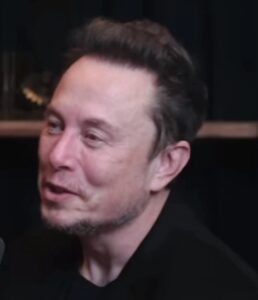As of October 2024, Elon Musk holds the title of the richest person in the world, with a net worth of approximately $269 billion. His wealth comes primarily from his leadership roles at Tesla, SpaceX, and X (formerly Twitter). Musk is closely followed by Larry Ellison and Jeff Bezos, who rank second and third, respectively.
Elon Reeve Musk’s success can be attributed to a combination of factors, including his relentless work ethic, ambitious vision, and willingness to take risks. He is known for tackling complex, high-stakes industries like space exploration (SpaceX), electric vehicles (Tesla), and energy solutions (SolarCity). Musk also embraces innovation and vertical integration, enabling his companies to control every aspect of their production processes.
His ability to gather and inspire highly skilled teams plays a crucial role, along with his focus on long-term goals rather than immediate profits. Additionally, Musk’s constant adaptation to technological advancements and keen sense of market trends have helped maintain his companies’ competitive edge.
Finally, Musk’s fearless attitude toward failure—viewing setbacks as opportunities to learn—has allowed him to push boundaries in industries others might avoid. These factors combined with his clear leadership style have been critical to his success.
Here’s a comprehensive list of factors contributing to Elon Musk’s success:
1. Visionary Leadership: Musk has a clear, long-term vision for the future, focusing on groundbreaking areas like sustainable energy, space exploration, and artificial intelligence. His ability to articulate bold goals attracts talent and investors.
2. Relentless Work Ethic: Known for his demanding work schedule (often working 80–100 hours a week), Musk’s dedication to his companies sets a high standard for employees and demonstrates his commitment to success.
3. Innovative Thinking: Musk consistently seeks out revolutionary solutions to complex problems, whether in electric vehicles, reusable rockets, or high-speed transportation. His willingness to challenge established industries and norms sets him apart.
4. Calculated Risk-Taking: Musk takes significant financial and technological risks, such as investing most of his personal wealth in his ventures. He bet on Tesla when it was near bankruptcy and SpaceX when it faced repeated launch failures, demonstrating a high tolerance for risk.
5. Vertical Integration: Musk believes in controlling as much of the production process as possible. At Tesla and SpaceX, vertical integration helps reduce costs, speed up innovation, and maintain quality control, giving his companies an edge over competitors.
6. Constant Learning: Musk is known for being a voracious reader and self-learner. He taught himself rocket science and automotive engineering, which allows him to deeply understand the industries he operates in, making him more effective as a leader and innovator.
7. Resilience and Persistence: Musk has faced numerous setbacks, including failed rocket launches, near bankruptcy, and harsh public criticism. However, his resilience and determination to keep moving forward after each failure have been essential to his success.
8. Recruiting Top Talent: Musk surrounds himself with highly talented engineers and leaders who share his passion for innovation. He has a knack for building strong teams and empowering them to push the limits of what’s possible.
9. Focus on First-Principles Thinking: Musk breaks down problems to their fundamental truths (first principles) and builds solutions from the ground up. This approach has led to breakthroughs in cost reduction and efficiency, particularly in battery technology and space travel.
10. Adaptability and Flexibility: Musk is known for pivoting quickly when things don’t go as planned. Whether adjusting business strategies at Tesla or SpaceX, he adapts to changing market conditions and technological challenges effectively.
11. Customer-Centric Innovation: Despite his forward-thinking ambitions, Musk remains highly focused on creating products that improve people’s lives, like electric cars and clean energy solutions. This keeps his innovations relevant and commercially viable.
12. Public Engagement and Branding: Musk uses platforms like Twitter to communicate directly with the public, building a personal brand that aligns with his companies. His transparency and interaction with followers keep his ventures in the public eye and build loyalty.
13. Leveraging Government Support: Musk has strategically partnered with governments to secure grants, contracts, and regulatory incentives. SpaceX, for example, has received NASA contracts, while Tesla benefits from subsidies and tax credits related to clean energy.
14. Diversified Ventures: By leading multiple companies (Tesla, SpaceX, Neuralink, The Boring Company), Musk hedges his bets across different sectors. This diversification enables him to take on more risks without being reliant on one single industry.
15. Focus on Scalability: Musk’s businesses are built with scalability in mind. Whether it’s manufacturing electric cars or launching rockets, he focuses on achieving economies of scale, which is critical to reducing costs and achieving market dominance.
16. Long-Term Focus Over Short-Term Gains: Musk prioritizes long-term goals (e.g., colonizing Mars, transitioning the world to sustainable energy) over immediate financial returns. This focus allows his companies to weather short-term challenges in pursuit of grander achievements.
17. Cross-Industry Collaboration: Musk’s ventures often collaborate across industries, sharing knowledge and technologies. For example, Tesla’s work in battery technology benefits SolarCity and SpaceX, creating synergies across his companies.
18. Media Attention and Public Relations: Musk understands the value of media coverage and uses both controversies and achievements to keep the public and investors engaged with his vision. His larger-than-life persona often helps raise awareness of his companies’ missions.
19. Embracing Failure: Musk views failure as an essential step in the innovation process. He embraces trial and error, recognizing that learning from failures leads to stronger, more refined solutions.
20. Financial Savvy: Despite the high-risk ventures Musk pursues, he has a keen understanding of how to raise capital, secure investment, and use his resources wisely. His ability to convince investors of his vision has kept companies like Tesla and SpaceX afloat during tough times.
These elements combined have made Elon Musk one of the most successful and influential entrepreneurs of our time, allowing him to revolutionize multiple industries simultaneously.

